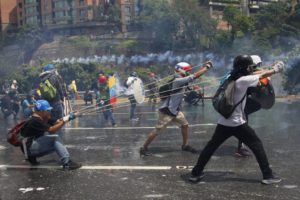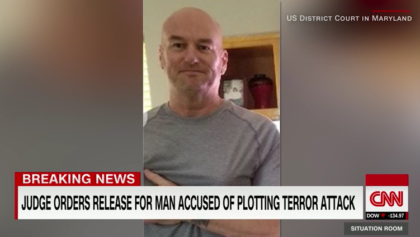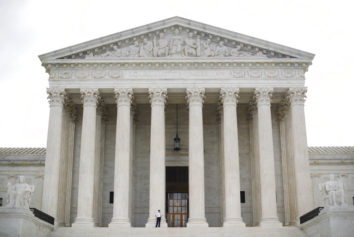
Anti-government protesters (AP Photo/Ariana Cubillos)
CARACAS, Venezuela (AP) — Oscar Perez is a cop, pilot, action movie star and dog trainer. He’s now also a fugitive, accused of strafing two key Venezuelan government buildings from a helicopter in a quixotic attempt to set off a revolt against President Nicolas Maduro.
Authorities on Wednesday conducted a nationwide manhunt for Perez a day after the government charged that he stole the police chopper and directed grenades and gunfire against the Supreme Court and Interior Ministry in what Maduro called a “terrorist attack.”
No one was injured, and there was no sign of damage at the buildings. But the episode added another layer of intrigue to a 3-month-old political crisis that has left at least 75 people dead and hundreds more jailed or injured in clashes between security forces and protesters seeking Maduro’s removal.
Did Perez act alone? Are other military uprisings in the works? Or was it an elaborate ruse clumsily orchestrated by the government to distract public attention or justify a tougher crackdown on the opposition?
Julio Borges, president of the opposition-controlled National Assembly, expressed doubts about Maduro’s version of events but cautioned that he and the rest of the opposition were still analyzing what happened.
“There are people who say it was a government-staged hoax, others who say it was real,” Borges said in a radio interview. “Whatever it was, it all points in the same direction: That the situation in Venezuela is unsustainable.”
Little is known about Perez.
On his Instagram account, he notes his job as a police investigator and tactical helicopter pilot and says his passion is Venezuela.
In 2015, he starred in a film called “Suspended Death,” and several photos show him in fatigues, bearing assault rifles, skydiving and standing in action poses with a German shepherd by his side.
Actor Marcos Moreno, who starred alongside Perez in the film, told The Associated Press that like many young officers in Venezuela, Perez was unhappy with the country’s growing crisis. He described the police investigator as an honest man and expressed doubt about the suggestions that Perez was in cahoots with a government plot to divert attention from Venezuela’s problems.
“He just wanted to raise appreciation for police in society,” Moreno said.
Sometime Tuesday, Perez posted on his Instagram account a video in which he read a manifesto calling for rebellion. He claimed to speak on behalf of a coalition of renegade members of the security forces.
Eyewitness accounts say the helicopter had hanging from its side a large banner referring to article 350 of Venezuela’s constitution, which empowers Venezuelans to disobey any regime that violates human rights.
“We have two choices: be judged tomorrow by our conscience and the people or begin today to free ourselves from this corrupt government,” Perez said while reading from the manifesto in front of four figures dressed in fatigues and ski masks and carrying assault rifles.
The government accused Perez and others in the helicopter of firing 15 shots at the Interior Ministry as a reception was taking place for 80 people. It then flew a short distance to the court, which was in session, and dropped grenades, two of them against national guardsmen protecting the building.
The helicopter was later found near the coast in Vargas state not far from Caracas, and elite special forces were deployed there to press the hunt, Vice President Tareck El Aissami said.
Photos of the pilot standing in front of the U.S. Capitol in Washington and a U.S. Coast Guard helicopter were shown on state television to bolster the government’s case that he was taking instructions from the CIA and the U.S. Embassy.
“The magistrates of the Supreme Court and other judges of the nation are under a terrorist threat, for which we will request the appropriate measures to safeguard our integrity and that of our institutions,” the high court said in a statement read by Maikel Moreno, the tribunal’s president.
As the drama was unfolding outside the court, inside magistrates were issuing a number of rulings further blocking the opposition.
One broadened the powers of staunchly pro-government ombudsman Tarek William Saab, allowing him to carry out criminal investigations that are the exclusive prerogative of chief prosecutor Luisa Ortega Diaz, who recently has become a strong critic of Maduro.
A defiant Ortega accused Maduro of carrying out “state terrorism” and said she won’t recognize three new rulings she portrayed as a brazen attempt to eliminate her position as the country’s top law enforcement official.
“These rulings are giving the power to investigate human rights abuses to people who possibly are violating those rights,” she said in her strongest remarks since breaking with Maduro over a ruling stripping the opposition-controlled legislature of its last powers.
Hours later, the government-stacked Supreme Court announced it was barring Ortega from leaving the country and freezing her bank accounts in order to ensure a complaint filed by a socialist party lawmaker against her can proceed.
Pedro Carreno is accusing Ortega of acting as an opposition leader and neglecting her duties as chief prosecutor. He has also asked the court to disclose any findings from a medical team that will evaluate her “mental insanity.”


